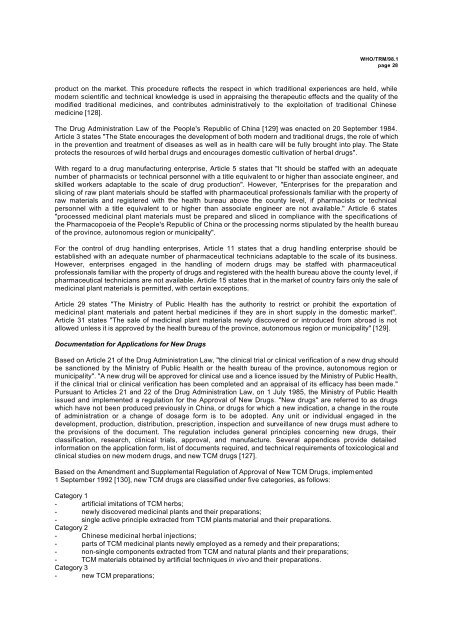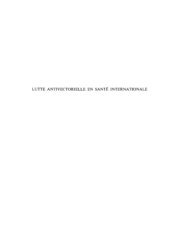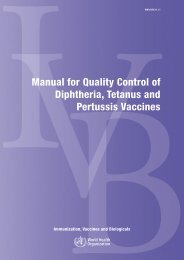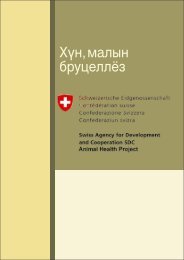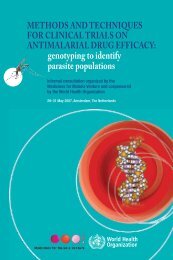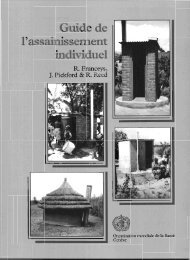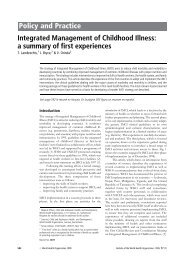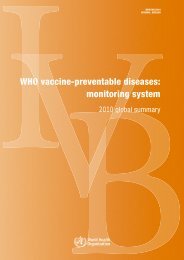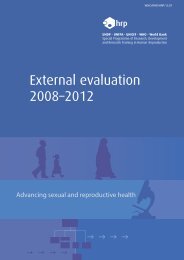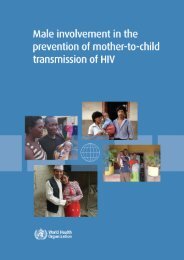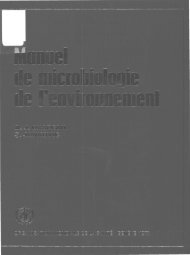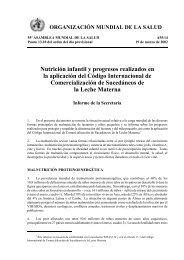Regulatory Situation of Herbal Medicines A worldwide Review
Regulatory Situation of Herbal Medicines A worldwide Review
Regulatory Situation of Herbal Medicines A worldwide Review
You also want an ePaper? Increase the reach of your titles
YUMPU automatically turns print PDFs into web optimized ePapers that Google loves.
WHO/TRM/98.1page 28product on the market. This procedure reflects the respect in which traditional experiences are held, whilemodern scientific and technical knowledge is used in appraising the therapeutic effects and the quality <strong>of</strong> themodified traditional medicines, and contributes administratively to the exploitation <strong>of</strong> traditional Chinesemedicine [128].The Drug Administration Law <strong>of</strong> the People's Republic <strong>of</strong> China [129] was enacted on 20 September 1984.Article 3 states "The State encourages the development <strong>of</strong> both modern and traditional drugs, the role <strong>of</strong> whichin the prevention and treatment <strong>of</strong> diseases as well as in health care will be fully brought into play. The Stateprotects the resources <strong>of</strong> wild herbal drugs and encourages domestic cultivation <strong>of</strong> herbal drugs".With regard to a drug manufacturing enterprise, Article 5 states that "It should be staffed with an adequatenumber <strong>of</strong> pharmacists or technical personnel with a title equivalent to or higher than associate engineer, andskilled workers adaptable to the scale <strong>of</strong> drug production". However, "Enterprises for the preparation andslicing <strong>of</strong> raw plant materials should be staffed with pharmaceutical pr<strong>of</strong>essionals familiar with the property <strong>of</strong>raw materials and registered with the health bureau above the county level, if pharmacists or technicalpersonnel with a title equivalent to or higher than associate engineer are not available." Article 6 states"processed medicinal plant materials must be prepared and sliced in compliance with the specifications <strong>of</strong>the Pharmacopoeia <strong>of</strong> the People's Republic <strong>of</strong> China or the processing norms stipulated by the health bureau<strong>of</strong> the province, autonomous region or municipality".For the control <strong>of</strong> drug handling enterprises, Article 11 states that a drug handling enterprise should beestablished with an adequate number <strong>of</strong> pharmaceutical technicians adaptable to the scale <strong>of</strong> its business.However, enterprises engaged in the handling <strong>of</strong> modern drugs may be staffed with pharmaceuticalpr<strong>of</strong>essionals familiar with the property <strong>of</strong> drugs and registered with the health bureau above the county level, ifpharmaceutical technicians are not available. Article 15 states that in the market <strong>of</strong> country fairs only the sale <strong>of</strong>medicinal plant materials is permitted, with certain exceptions.Article 29 states "The Ministry <strong>of</strong> Public Health has the authority to restrict or prohibit the exportation <strong>of</strong>medicinal plant materials and patent herbal medicines if they are in short supply in the domestic market".Article 31 states "The sale <strong>of</strong> medicinal plant materials newly discovered or introduced from abroad is notallowed unless it is approved by the health bureau <strong>of</strong> the province, autonomous region or municipality" [129].Documentation for Applications for New DrugsBased on Article 21 <strong>of</strong> the Drug Administration Law, "the clinical trial or clinical verification <strong>of</strong> a new drug shouldbe sanctioned by the Ministry <strong>of</strong> Public Health or the health bureau <strong>of</strong> the province, autonomous region ormunicipality". "A new drug will be approved for clinical use and a licence issued by the Ministry <strong>of</strong> Public Health,if the clinical trial or clinical verification has been completed and an appraisal <strong>of</strong> its efficacy has been made."Pursuant to Articles 21 and 22 <strong>of</strong> the Drug Administration Law, on 1 July 1985, the Ministry <strong>of</strong> Public Healthissued and implemented a regulation for the Approval <strong>of</strong> New Drugs. "New drugs" are referred to as drugswhich have not been produced previously in China, or drugs for which a new indication, a change in the route<strong>of</strong> administration or a change <strong>of</strong> dosage form is to be adopted. Any unit or individual engaged in thedevelopment, production, distribution, prescription, inspection and surveillance <strong>of</strong> new drugs must adhere tothe provisions <strong>of</strong> the document. The regulation includes general principles concerning new drugs, theirclassification, research, clinical trials, approval, and manufacture. Several appendices provide detailedinformation on the application form, list <strong>of</strong> documents required, and technical requirements <strong>of</strong> toxicological andclinical studies on new modern drugs, and new TCM drugs [127].Based on the Amendment and Supplemental Regulation <strong>of</strong> Approval <strong>of</strong> New TCM Drugs, implemented1 September 1992 [130], new TCM drugs are classified under five categories, as follows:Category 1- artificial imitations <strong>of</strong> TCM herbs;- newly discovered medicinal plants and their preparations;- single active principle extracted from TCM plants material and their preparations.Category 2- Chinese medicinal herbal injections;- parts <strong>of</strong> TCM medicinal plants newly employed as a remedy and their preparations;- non-single components extracted from TCM and natural plants and their preparations;- TCM materials obtained by artificial techniques in vivo and their preparations.Category 3- new TCM preparations;


